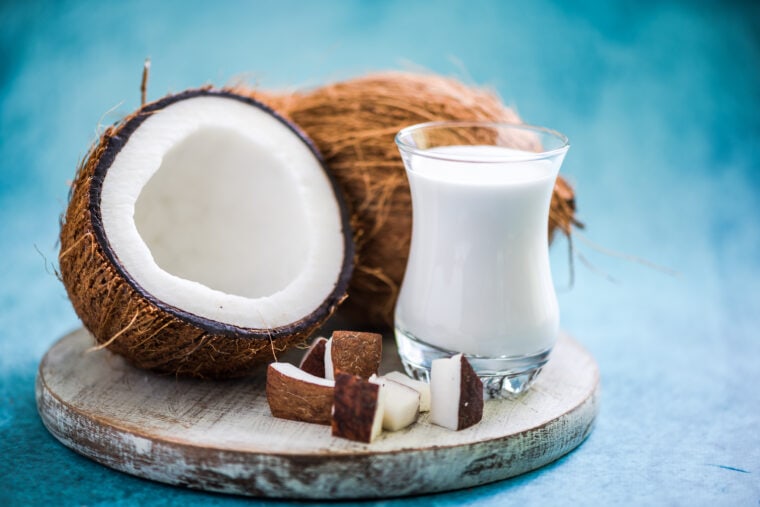
Click to Skip Ahead
A cat’s love of milk seems pretty well documented, at least if we’re using cute YouTube videos for reference! We’ve all seen those videos of cats lapping at a saucer of milk, spraying the liquid all over the surrounding area, and somehow back at themselves.
Milk isn’t actually something your adult cat needs, and this applies to different types of milk, including the coconut variety. But you’re probably wondering whether coconut milk could cause any harm to your cat. While coconut milk is non-toxic, it’s unhealthy and shouldn’t be offered to your pet.
Coconut milk isn’t part of your cat’s natural diet and may contain ingredients that could harm him. Read on to learn more about coconut milk and why you should stick to water only for your kitty.
What Is Coconut Milk?
Coconut milk is a processed coconut byproduct made from the liquid extracted from mature coconut meat. It’s not the liquid you’d hear sloshing around inside a fresh coconut—that’s coconut water. The milk is created when shredded coconut flesh is pureed with water and strained. The amount of water used during this process will determine whether the resulting milk is thick or thin. Humans often use the thin kind as a substitute for cow’s milk, while the thick variety is great for use as a thickening agent in sauces.

Why Shouldn’t Cats Drink Coconut Milk?
Coconut milk isn’t ideal for your kitty for two main reasons.
Coconut Milk is Not Part of Your Cat’s Natural Diet
Your cat is an obligate carnivore who thrives on a meat-based diet. His gastrointestinal tract and metabolism have adapted to eating and processing meat. This is why veterinarians do not recommend a vegetarian or vegan diet for cats. They simply do not digest plant material well and will not derive the nutrients they need from a plant-based diet.
Coconuts in their raw form are not part of your cat’s natural diet, nor is the fruit’s milk or water.

Coconut Milk Contains Unhealthy Ingredients
Coconut milk is rich in fats and oils, components your pet doesn’t require in his diet. Some varieties also contain sugar.
Fats, oils, and sugars can cause several health issues for your kitty if fed too often, as they’re all calorically dense. A cat taking in more calories than necessary will become overweight and may be at risk of developing health conditions like cancer, diabetes, and heart disease due to his weight. In addition, studies show a 2.8-fold increase in mortality in obese cats.
Additionally, the high amount of oil in coconut milk will likely cause gastrointestinal upset in your kitty.
What Do I Do If My Cat Drank Coconut Milk?
Coconut milk is generally non-toxic, so if you find your kitty helping himself to a taste of your glass of coconut milk, you generally don’t need to worry. A little sample here and there isn’t going to cause any long-lasting damage to your kitty.
However, if he went overboard and drank far too much, you may notice him exhibiting the following gastrointestinal signs:
What Can Cats Drink?

While humans have a plethora of beverage types at their disposal, your feline family member only requires one—good old H2O.
Contrary to popular belief, cow’s milk isn’t good for adult cats, as most are lactose intolerant. Of course, kittens need their mother’s milk until they’re around four to five weeks old. Kittens have a stomach enzyme that allows them to break down the lactose in their mother’s milk. Adult cats lose this enzyme as they age and, along with it, the ability to digest milk sugars.
Final Thoughts
While coconut milk isn’t toxic for cats in the same way other human foods are (we’re looking at you, onions), offering it to your kitty is not recommended. Coconut milk offers no nutritional value to your obligate carnivore and may just give him a bad case of the runs. It’s best to keep your kitty on a strict water-only regimen.
See Also:
- What Common Foods Are Toxic to Cats? What To Avoid & Vet-Approved Alternatives
- Can Cats Drink Evaporated Milk? Vet-Approved Risk, Facts, &FAQ
- Can Cats Drink Plant Milk? Vet-Approved Risks & FAQ
Featured Image Credit: marcin jucha, Shutterstock







